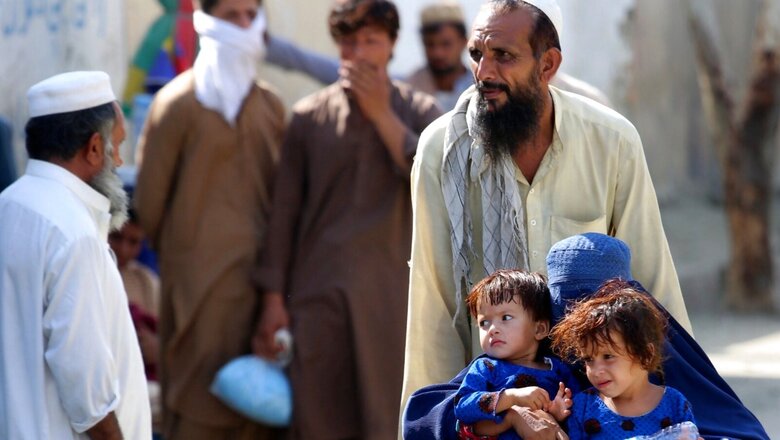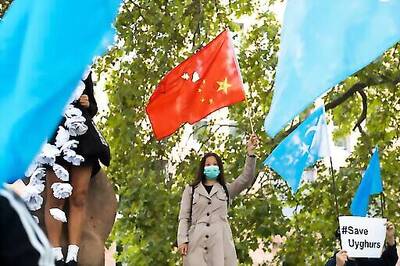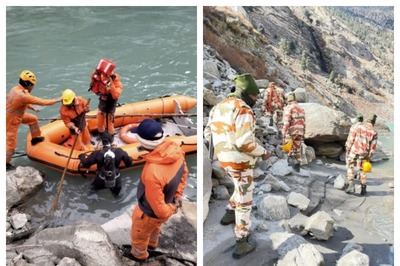
views
The Taliban’s takeover of Afghanistan has stoked an exodus of Afghans as thousands were seen desperately trying to flee the country, clutching papers and toddlers fearing a repeat of the darkest years.
Dramatic visuals around Kabul’s Hamid Karzai International Airport continue to lay bare the chaos and humanitarian crisis that has unfolded in war-torn Afghanistan. The world on Friday witnessed a heart-wrenching video of a crying baby being handed over a barbed-wire fence to US Marine troops at the Kabul airport.
On Friday, the United Nations refugee agency said that most Afghans are unable to leave their homeland and those who may be in danger “have no clear way out”.
Shabia Mantoo, spokesperson of the U.N. High Commissioner for Refugees (UNHCR), reiterated its call to neighbouring countries to keep their borders open to allow people to seek asylum in light of what she called the “evolving crisis”.
“The vast majority of Afghans are not able to leave the country through regular channels,” she told a Geneva news briefing. “As of today, those who may be in danger have no clear way out.”
Currently, Pakistan and Iran host 90% of the 2.6 million Afghan refugees registered since fleeing their homeland over the last decades.
Who is a Refugee
The United Nations High Commissioner for Refugees defines a refugee as “someone who has been forced to flee his or her country because of persecution, war or violence”.
“A refugee has a well-founded fear of persecution for reasons of race, religion, nationality, political opinion or membership in a particular social group. Most likely, they cannot return home or are afraid to do so. War and ethnic, tribal and religious violence are leading causes of refugees fleeing their countries.
According to the UNHCR, 68% of those displaced across borders come from just five countries: Syria, Venezuela, Afghanistan, South Sudan and Myanmar. As of 2020, there are around 2.8 million Afghan refugees abroad.
“UNHCR remains concerned about the risk of human rights violations against civilians in this evolving context in Afghanistan, including women and girls,” the UNHCR said on Friday.
Countries Offering Refuge to Afghans
United States
So far, about 1,200 Afghans have been evacuated to the United States and that number is set to rise to 3,500 in the coming weeks under “Operation Allies Refuge,” with some going to a U.S. military base in Virginia to finalize their paperwork and others directly to U.S. hosts.
The US last week had announced the Priority 2 (P-2) designation that grants US Refugee Admissions Program (USRAP) access to certain Afghan nationals and their eligible kin.
In a statement, the US Department of State, “The U.S. objective remains a peaceful, secure Afghanistan. However, in light of increased levels of Taliban violence, the U.S. government is working to provide certain Afghans, including those who worked with the United States, the opportunity for refugee resettlement to the United States.”
The US may reportedly take in over 10,000 Afghan nationals, including those who aided the American government.
Canada
Last week, Canada committed itself to resettle 20,000 Afghan refugees who have already fled the country, and on Friday Mendicino said the government was keeping an open mind about potentially increasing that number.
Canada would consider taking in additional Afghan refugees on behalf of the United States or other allies if asked to do so, Immigration Minister Marco Mendicino said on Friday.
“We should keep the door open to all possibilities,” Mendicino said in an interview.
“If there were Afghans who had assisted coalition partners during the mission that also met the criteria for our humanitarian resettlement program, I think we should be prepared to consider such an arrangement,” the minister said.
Canada is part of a coalition of countries frantically trying to evacuate Afghan citizens who supported Western missions in Afghanistan over the years, amidst a Taliban takeover of the country that occurred in days, rather than months as expected.
Canada withdrew the bulk of its troops from Afghanistan in 2011, but participated in a NATO mission to train the Afghan military until 2014.
United Kingdom
Britain on Tuesday announced plans to welcome up to 5,000 Afghans fleeing the Taliban during the first year of a new resettlement programme that will prioritise women, girls and religious and other minorities.
British Prime Minister Boris Johnson-led UK government said the programme is separate from efforts to grant interpreters and other staff who worked with UK officials and forces in Afghanistan the right to live in the UK.
India
India is not a signatory to the 1951 Convention on Refugees or the 1967 Protocol Relating to the Status of Refugees and does not have a separate statute for refugees. So far, the country has handled refugee crises in the neighbourhood and beyond on an individual case basis.
Last week, in view of the spiralling crisis in Afghanistan, India introduced a new category of e-visa for Afghan nationals to fast-track their applications for entry into the country. These visas are to be valid for six months only and the plan further has not been decided by the Centre yet.
In 2011, the Indian government had directed all states and Union Territories a Standard Operating Procedure to deal with foreign nationals who claimed to be refugees.
Pakistan
Even though Prime Minister Imran Khan had in June said that Pakistan would seal its border with Afghanistan in case the Taliban takes over, borders have so far remained open to Afghans. Khan had told the New York Times that Islamabad “did not want another influx of refugees from its neighbour”, as the country is already struggling to cope with the estimated three million Afghan migrants.
In an interview, Information Minister Fawad Chaudhry told the Time magazine that Islamabad was preparing a “comprehensive strategy” to isolate refugees in temporary camps near the border to prevent further influx into Pakistan.
Iran
Iran is building temporary accommodation camps in three provinces for a potential influx of Afghan refugees.
Meanwhile, Hossein Ghassemi, interior ministry border affairs chief, told the IRNA news agency that any Afghans who crossed into Iran would, “once conditions improve, be repatriated”.
Iran, which shares a 900-kilometre (560-mile) border with Afghanistan, hosts highest refugees from Afghanistan with nearly 3.5 million migrants, as per the UN’s refugee agency.
Uzbekistan
As the Taliban took control of Afghanistan in a swift power grab, thousands of Afghans have been looking for ways to escape what they see as a return of a ruthless fundamentalist rule. But neighboring Uzbekistan appears wary about a flood of Afghan refugees.
Afghan citizens who applied for Uzbek visas in recent months told The Associated Press that Uzbekistan has been refusing visas to Afghans, citing coronavirus concerns.
Experts note that Uzbek authorities have long maintained a tightly closed border with Afghanistan, fearing an influx of extremists, and have only accepted a handful of asylum-seekers from its unstable neighbor.
Since the Taliban controlled Afghanistan in the 1990s, “the Uzbek government has continually refused to sign and ratify the Refugee Convention one of the most widely observed treaties in the world which would require it to provide some type of processing and protection to those seeking asylum out of fear of persecution, said Steve Swerdlow, a human rights lawyer and associate professor of human rights at the University of Southern California.
North Macedonia
North Macedonia will by the end of the week temporarily take in 450 Afghans fleeing the Taliban takeover of their country and seeking visas to enter the United States, the Skopje government said on Tuesday.
North Macedonia is the third country in the Western Balkans, along with Albania and Kosovo, to have approved a request by the administration of U.S. President Joe Biden to admit Afghan refugees.
The refugees to arrive in North Macedonia will be employees and families of Afghan employees “in humanitarian and peacekeeping missions, activists from rights organizations, journalists, translators, students and scholarship holders,” North Macedonia’s government said in a statement.
“Most of the 450 (Afghan) citizens are expected to arrive by the end of the week, depending on conditions at Kabul airport.”
Uganda
Uganda said on Tuesday it had agreed to a request from the United States to take in temporarily 2,000 refugees from Afghanistan fleeing after the Taliban takeover.
The east African nation has long experience receiving people escaping conflict and currently hosts about 1.4 million refugees, most from South Sudan.
“The request was made yesterday by the U.S. government to H.E. (President Yoweri Museveni) and he has given them an OK to bring 2,000 (Afghan) refugees to Uganda,” Esther Anyakun Davinia, Uganda’s junior minister for relief, disaster preparedness and refugees, told Reuters.
“They are going to be here temporarily for three months before the U.S. government resettles them elsewhere.”
Albania and Kosovo
Albania and Kosovo have accepted a U.S. request to temporarily take in Afghan refugees seeking visas to enter the United States, the country two countries said on Sunday.
In Tirana, Prime Minister Edi Rama Rama said U.S. President Joe Biden’s administration had asked fellow NATO member Albania to assess whether it could serve as a transit country for a number of Afghan refugees whose final destination is the United States.
“We will not say ‘No’, not just because our great allies ask us to, but because we are Albania,” Rama said on Facebook.
Sources had told Reuters that Biden’s administration had held discussions with such countries as Kosovo and Albania about protecting U.S.-affiliated Afghans from Taliban reprisals until they completed the process of approval of their U.S. visas.
In Kosovo, President Vjosa Osmani said the government had been in contact with the U.S. authorities about housing Afghan refugees since mid-July.
“Without any hesitation and … conditioning I gave my consent to that humanitarian operation,” Osmani said on her Facebook account.
Osmani said Afghan refugees would be vetted by the U.S. security authorities, and added they would stay in Kosovo until their documentation for U.S. immigration visas was arranged.
Hundreds of U.S. troops are still stationed in Kosovo as peacekeepers more than two decades after the 1998-99 war with the then-Yugoslav security forces.
Turkey
On Saturday, migrants from Afghanistan were detained by Turkish security forces during an operation in the border city of Van, Turkey. The government has stepped up the construction of a border wall with Iran in recent days.
Turkish President Recep Tayyip Erdoğan last week said that Ankara will work with Pakistan to help “stabilise” Afghanistan and prevent a new exodus of refugees from the country.
(With inputs from agencies)
Read all the Latest News, Breaking News and Assembly Elections Live Updates here.




















Comments
0 comment